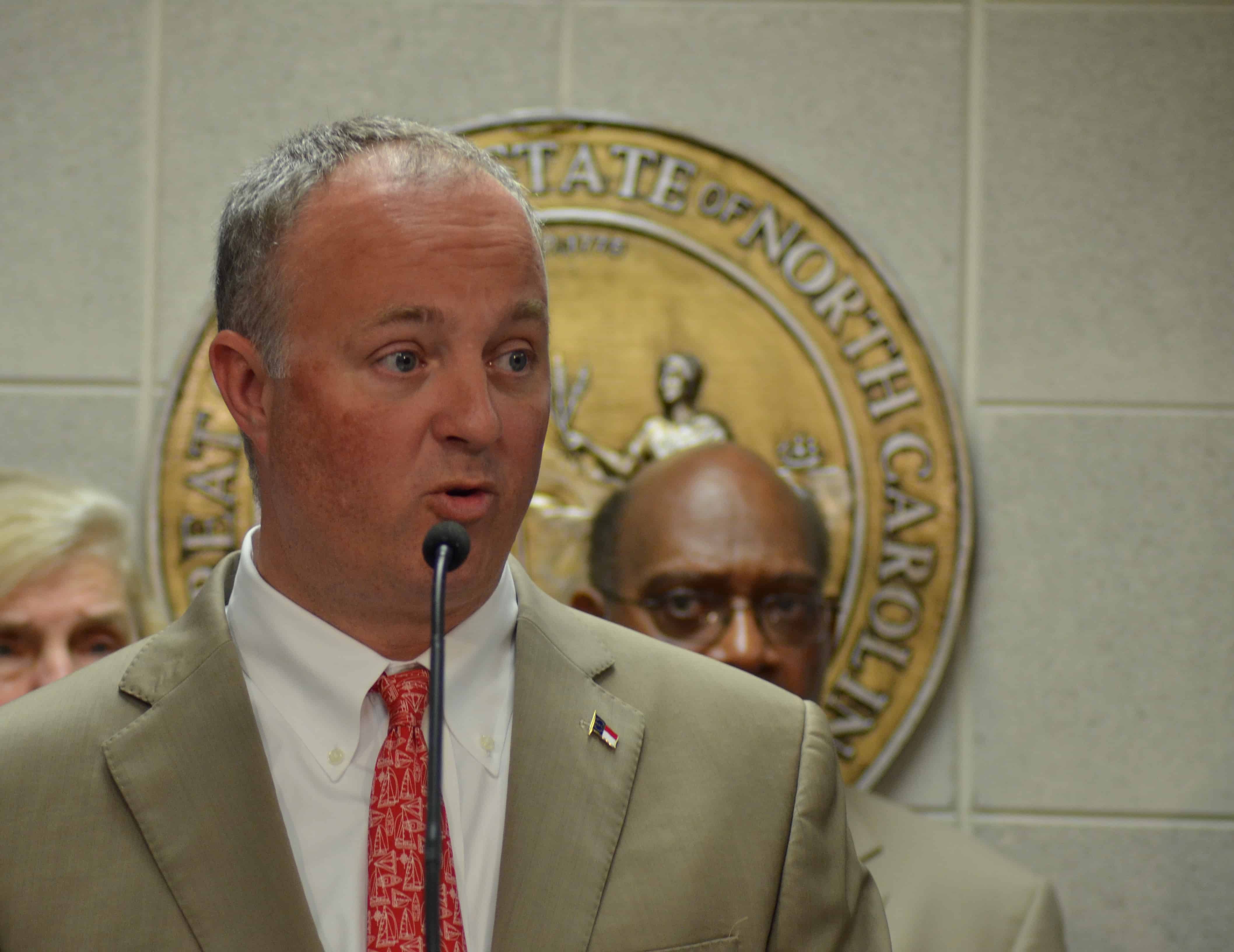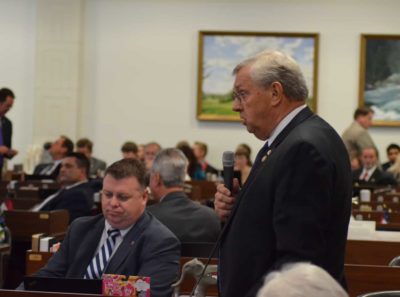The state House gave final approval to the compromise budget today, 77-38. The measure now goes to Gov. Roy Cooper for his signature or veto.
House Democrats spent the last session before the final vote attacking various provisions of the proposal and pushing back against the notion that they were given the opportunity to participate in its formation.
Rep. Michael Speciale, R-Craven, said that Democrats were in the same committee meetings as Republicans and had the chance to offer amendments, comment on the House proposal, and vote on preliminary versions.
Rep. Grier Martin, D-Wake, took issue with Speciale’s comments. While he agreed that Democrats were in committee meetings on the House budget, he disagreed that they had any meaningful chance to contribute.
“The budget document that we have before us, the conference report, is not in any way shape or form a product of that process,” he said, adding a moment later: “What we have before us is a bill that was put together behind closed doors where none of us had any input, and I think very few of you all had any input either.”
Aspects of the budget’s education plan came under scrutiny during the debate. Rep. Graig Meyer, D-Orange, spent his entire time speaking on the floor focused on education.
“There are those who believe this General Assembly is out to intentionally harm schools,” he said, “This budget will do nothing to calm the fears of teachers and parents who love our public schools but are struggling to maintain their investment in them,” he added.
He targeted the budget proposal’s teacher pay plan, which amounts to a 9.6 percent raise over the two years of the biennium (3.3 percent in the first year). Meyer said that many teachers will not see much of a pay boost under the plan.
“Many educators believe that the General Assembly is especially hostile to veteran teachers,” he said. “This budget does nothing to allay those fears.”
He said that teachers with 25 years get only a .6 percent raise over the biennium, which he says amount to about $30 extra a month. Under Cooper’s pay plan, which would have amounted to an average 10 percent pay increase over the biennium (five percent each year), Meyer said those veteran teachers would get about $350 more a month.
The pay raises were also discussed in two press conferences earlier in the day, one led by Democrats and another led by Republicans.
In the Republican press conference, Senate President Pro Tempore Phil Berger, R-Rockingham, said the Republican budget meets what the governor said he wanted.
“What he said was a 10 percent raise over the course of two years. This budget has a 10 percent raise over the course of two years,” Berger said. “I don’t know anybody up here that got everything they wanted in the budget. And I think it’s problematic for the governor to think that just because he asked for something that it’s something we must do.”
While the Republican budget might have an almost 10 percent raise (9.6 percent) over two years, House Minority Leader Darren Jackson, D-Wake, said that the governor’s plan would have spent more actual dollars on pay raises. He said that in the first year of the biennium, the governor would have invested $270 million while the Republican plan spends only about $100 million. In the second year, the governor would have spent $540 million while the Republicans will spend about $370 million.
While the average salary increases look similar in both the governor’s budget and the General Assembly’s budget compromise, Jackson argued that because of how those pay raises are dispersed, the governor’s budget would have been far more favorable to teachers. The governor’s pay raises are more uniform for teachers. Jackson said the lowest raise under the governor’s proposal is more than 7 percent, while the lowest raise under the Republican’s proposal is under 1 percent.
Meyer also called out $50 million for teacher bonuses in the budget compromise. The bonuses target specific teachers in different areas rather than the teaching profession as a whole. For example, the plan includes $25 million additional dollars for a bonus program, based on performance, that goes to the best 4th and 5th grade reading teachers and 4th and 8th grade math teachers.
“While bonuses may help individual teachers, they won’t help keep teachers in the classroom,” Meyer said.
He said that research shows that school-wide bonuses are the most effective, and he added that he guessed that teachers would prefer that the bonus money be used for salary increases.
Meyer mentioned the class size restrictions slated to go into effect in the 2018-19 school year. These restrictions, added to the budget last session, eliminate the flexibility that school districts use to pay for so-called “enhancement” teachers. These are teachers who lead classes such as art, physical education, and music. The restrictions were originally going to go into effect this upcoming school year, but House Bill 13 delayed full implementation by a year.
Local districts are concerned that the General Assembly will not provide dedicated funds for those enhancement teachers next year. And the budget compromise does not offer any.
“There is no money in this budget,” Meyer said.
“I don’t know what these schools are going to do,” Jackson said. “I guess once we pass this they’re just out of luck.”
In a press conference earlier in the week, lawmakers said a provision in the budget compromise codified its intent to use data from local districts to determine the need for enhancement teachers and then fund an allotment to pay for those teachers. However, that provision did not actually make it into the budget.
Shelly Carver, a spokesperson for Berger, said the oversight was not intentional.
“I believe it was inadvertent and will be included in a technical corrections bill,” she said.
She did not have a timeline on when that might happen.
Meyer also took issue with a variety of budget provisions focused on the office of the State Superintendent and the state Department of Public Instruction (DPI).
DPI funding would be reduced by 6.2 percent in the first year and 13.9 percent total over the biennium. The proposal would also include $1 million for an audit of DPI that will increase the total two-year cut to about 15.8 percent, according to staff from the office of Rep. Nelson Dollar, R-Wake, senior chair of the House Appropriations Committee.
In addition, a number of positions are cut from DPI including:
Chief Performance Officer
Education Program Director
Education Consultant III
Accountant
Education Diagnostician I
Education/Development Aide II
Education/Development Aide I
Business Technology Analyst
Digital Learning Plan Project Coordinator
Education Consultant II
Director of External Meetings & Special Projects
The budget labels all but three of those positions as vacant.
Meyer said DPI has lost 197 state-paid positions during the last 10 years, which amounts to about 31 percent of its workforce. The budget compromise reduces DPI resources while adding more than 20 additional reporting requirements to the department.
“How in the world are they supposed to meet those new expectations?” he asked.
He also questioned the $1 million audit, which is anticipated to find $1 million in savings from DPI.
“I guess I should have been a school auditor rather than a school social worker,” he said. “Can anyone tell me why this audit will cost so much? What is it supposed to do?”
He also wondered why the state auditor could not do the audit, and how the state was so sure the audit would find $1 million in savings.
Under the budget compromise, Mark Johnson, the state Superintendent of Public Instruction, receives $700,000 in both years of the biennium to hire up to 10 employees who would report directly to him and would be exempt from the State Human Resources Act.
“We don’t know what these people will do” Meyer said. “We don’t know why the superintendent needs a personal staff when he already has a whole department working for him. We just know the superintendent gets a posse.”
Attempts to reach Johnson this week for comment on the budget were unsuccessful.
Meyer ended his remarks by saying “Our state has lost faith in this body’s ability to govern public schools.”
Speciale stood up directly after Meyer and responded to his complaints.
“I would like the Speaker to assign a couple of my colleagues to hold the ceiling up, because apparently the sky is falling,” he said.
He challenged Meyer’s assertion that the state doubted the Republicans’ ability to govern.
“We’re still here in record numbers on this side of the aisle, so apparently we’ve been doing something right.”
He accused the Democrats of grandstanding for the cameras, and told them that the Republicans do not necessarily believe that everybody should get the same pay raises.
“We don’t view things as socialist, as some of you might view it,” he said.
Rep. David Lewis, R-Harnett, said that the comments heard on the House floor had been instructive.
“We learned that some people believe some strange things,” he said.
Then he gave examples of other strange beliefs, like the idea that the world is flat, that there are hot dogs other than the red ones in Smithfield, and that Nickelback is a good band.
“The truth is though that most of us have made up our minds on how we’re going to vote on this budget,” he said.
In the Republican press conference earlier in the day, Berger noted not only the budget proposal’s teacher pay raise, but also the provision that creates 3,535 new seats for NC Pre-K, cutting the program’s waiting list by 75 percent.
Both the House budget proposal and Cooper’s plan would have cut the waiting list entirely.
Berger also attacked Cooper’s vocal opposition to the Republican budget plan this week.
“To hear the governor talk you would thing we’re on the brink of the apocalypse,” Berger said, adding a moment later: “I think the governor should spare us the melodrama and save the theatrics for his campaign commercials.”
House Speaker Tim Moore, R-Randolph, said during the press conference that he has two children in the state’s public school system, and so is just as concerned with education as other North Carolinians.
“I’m concerned about teacher pay and everything,” he said. “But the main thing I’m concerned about is making sure my kids and everybody else’s children are getting the best education possible.”
He said a key part of that is teacher pay, and he said that the state is on track to get average teacher salary up to $55,000 by 2020.
The Governor’s spokesperson, Ford Porter, released a statement after the passage of the House budget today.
“This isn’t that complicated: Legislative Republicans are giving more tax breaks for the wealthy and shortchanging education, our economy, and middle class families. The more we learn about this budget, the worse it is. Instead of crafting a budget that works for the whole state, legislators voted to add hidden policy changes and diverted millions of dollars in spending for pet projects in their own districts at the last moment with no time for review. Our staff is reviewing those to ensure a complete response. The Governor made clear that he thinks this budget lacks vision and unfairly picks winners and losers and he will announce his plans in coming days.”



